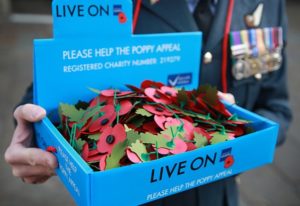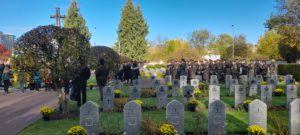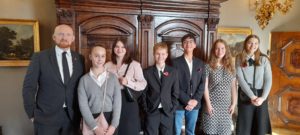Every year at the English College we remember those who died in the service of their country. Last week, Dr Brown took an assembly for Years 1 and 2 where he talked about the meaning of Remembrance Day. He told them about the red paper poppies that we sell to raise money for the Royal British Legion.
Royal British Legion Poppy Appeal

The Royal British Legion is a UK charity. It organises one of the most successful charity collections in the country. Every year, thousands of volunteers sell millions of poppies to help ex-servicemen and women and their families. The poppy is the symbol of this important charity because it was the first flower to grow back in the battlefields of northern France and Belgium after WWI.
Remembrance Sunday
Remembrance Sunday takes place on the second Sunday of November, the nearest Sunday to Armistice Day. The first Armistice Day was on 11 November 1918. At the eleventh hour of the eleventh day of the eleventh month, the guns fell silent to mark the end of WW1.
Students joined Dr Brown and Mr Emmerson to represent the College at this year’s Remembrance Sunday ceremony at the Commonwealth War Cemetery at Olšany. A ceremony just like the one they attended here in Prague takes place in every city, town and village in the UK. Local people come together to remember those who fought for the freedoms we all enjoy today, but who never came back. One of the students, Emilly Hégr in Year 1, said, “What I found most touching at the ceremony was definitely the prayers at the beginning of the ceremony. They really touched my heart.”
Known unto God

After the ceremony, our students were able to walk along the rows of gravestones. 290 soldiers, sailors and aircrew are buried there. Most are from Commonwealth countries. There are also the graves of eight Polish soldiers. Particularly poignant are the graves with no name. Their headstones read simply ‘Known unto God’. The remains they contain could not be identified. They belong to young men whose families knew only that their sons or husbands or brothers were ‘missing in action’. They never knew where they had died and were buried, were never able to visit their grave.
Year 2 student, David Vesa, said, “The Remembrance ceremony was a touching tribute and engaging in conversations with distinguished military veterans and ambassadors added profound depth to the meaningful experience.”
British Embassy

After the ceremony, staff and students went back to the British Embassy for the Ambassador’s chef’s famous ‘traditional curry lunch’. The British Embassy is housed in the magnificent Thun Palace in Malá Strana. Students were able to see inside this historic building and its beautiful garden, at the foot of Prague Castle, as well as enjoy a splendid lunch.
Filip Bulušek in Year 1 said, “I found Remembrance Day very interesting but the biggest memory I have is the visit to the British Embassy. We met the British Ambassador Matt Field and we also had our photo taken with him. Remembrance Day was a great occasion and I would like to attend it again next year. “